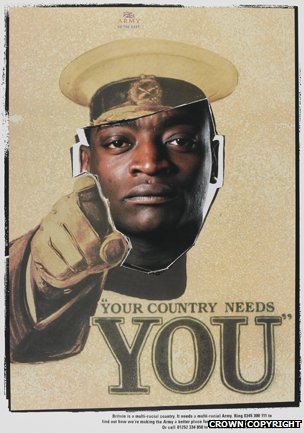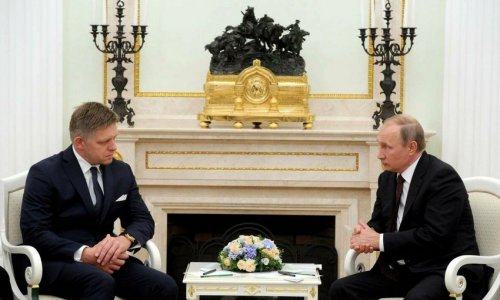It is perhaps history's most famous pointing finger.The image of British war minister Lord Kitchener's index finger unsettlingly aimed at the viewer remains immediately recognisable 100 years after its design. Still regularly copied in advertising, it has also served as a satirical motif in the media and inspired military recruitment campaigns across the globe.Most people assume this image owes its fame to a government recruiting campaign during World War One.But of the estimated 5.7 million official posters printed in the UK from 1914-18, as few as 10,000 copies of this particular image were made.It was initially intended only as a front cover design for the London Opinion magazine on 5 September 1914, created by professional illustrator Alfred Leete, supposedly in a single day. The cover bore the message "Your Country Needs You".The slogan was then slightly tweaked to simply "Wants You" and the image was privately produced as a poster shortly afterwards. But there is little photographic evidence of it on display in public places and only a handful of original copies survive today.The authorities had already anticipated that an image of Kitchener - immensely popular with the public and seen as a great symbol of army and empire - would be good for recruiting.But in the first instance the official Parliamentary Recruitment Committee poster used a completely different and far less dramatic image of the field marshal. It was next to a rather uninspiring quote from one of his speeches: "Men, materials & money are the immediate necessities. Does the call of duty find no response in you until reinforced - let us rather say superseded - by the call of compulsion? Enlist today."With a print-run potentially 15 times that of the poster based on Leete's image, it was given the resources and prominence to be remembered above all others, but is now largely forgotten.So why, almost 100 years on, does Leete's design retain such potency?"Among the myriad of images pushed towards us each day, that of Kitchener pointing is an instantly recognisable symbol of World War One," says the Museum of Brands founder Robert Opie. "Television programmes have used the poster in advertising campaigns to immediately establish that the show is set at the time of the Great War."Its longevity, he adds, is also a result of Leete's powerful design with "Lord Kitchener's eyes following you round the room like the Mona Lisa".Leete's illustration carefully manipulates Kitchener's actual appearance. Firstly, his squint - clearly visible in the official, long-winded poster - is corrected. His moustache was darkened and widened. The design is probably based on a photograph taken some 30 years earlier, as by the start of the war, Kitchener was 64.Kitchener's hand gesture is equally provocative in its directness. "Pointing is individualistic, it singles out one person alone," says University of Hertfordshire psychology professor Karen Pine. "This makes you more engaged and places you under an obligation to respond."The illustrator's work also compared favourably with official recruitment posters of the time. As Richard Slocombe, senior curator of art at the Imperial War Museum, explains: "Poster design was a very mechanical process with little finesse. A large number solely used words."In contrast, Leete was a renowned cartoonist "who knew how to connect with the wider public through his work and understood the importance of simplicity".Those four words, "Your Country Needs You", also proved effective. "They evoke patriotism and guilt in those yet to enlist without straying as far as emotional blackmail," says the National Army Museum's David Bownes, co-author of Posters of the First World War.The success of the image has arguably enabled it to transcend the legacy of Lord Kitchener himself. Leete's design has been copied by military recruitment campaigns from India to Canada to Germany. Four million copies of James Montgomery Flagg's Uncle Sam poster were printed by the US during WW1. Indeed, the image still features in the country's recruitment drives today.As recently as 1998 a version of the Kitchener poster was used in a campaign to improve the number of ethnic minority recruits in the British Army. Kitchener's face was replaced in two posters by servicemen of African and Asian heritage.As a humorous motif it is even more widely used.The Sunday Times replaced Kitchener's face with David Cameron's after the prime minister used the phrase "your country needs you" when promoting his vision of the Big Society in October 2010.Any nod to the famous poster can be humorous because of how unusual the pointing gesture now seems. "We're less deferential to authority now, so politicians are trained to use open-hand gestures rather than point," explains Karen Pine.Opie explains that the poster remains widely used because "it contains everything a caricaturist needs - a strong, powerful image that can act as a quick and easy communicator".In the 1960s, two boutiques called I Was Lord Kitchener's Valet - incorporating Leete's design in their advertisements - opened in London's Portobello Road and Carnaby Street. Selling military memorabilia and clothing to customers including Jimi Hendrix, John Lennon and Eric Clapton, they invoked ironic nostalgia towards the age of authority in which Kitchener lived.Since then, everything from mugs to T-shirts have carried Kitchener's face, including duvet covers claiming "your bed needs you". And his image has recently featured on a special edition £2 coin commemorating the war.Who was Lord Kitchener?Horatio Kitchener was born on 24 June 1850 in County Kerry, IrelandEducated in Switzerland and at the Royal Military Academy, WoolwichTook part in the unsuccessful operation to relieve General Charles Gordon at Khartoum in 1884-1885, and in 1886 was appointed governor general of eastern SudanIn 1902 he was appointed commander in chief of IndiaIn 1911, he became the proconsul of Egypt, serving there and in the Sudan until 1914When war broke out, he reluctantly accepted the appointment of secretary of state for warCredited with great foresight in recognising that WW1 would last several years and require a large armyDied on 5 June 1916 in the sinking of HMS Hampshire, as he journeyed to RussialineKitchener and his pointing finger are still regularly used in the promotion of everything from local fetes to garage sales. But for Martyn Thatcher, author of the Amazing Story of the Kitchener Poster, the image has often become "a lazy piece of graphic design".The controversies that surrounded Lord Kitchener - famed for his disputes with political and military figures of the time - have been widely obscured in favour of Leete's evocative caricature. His successes have been reduced to a single image.Lord Kitchener was uneasy about his use in recruitment campaigns. He believed it should be the country's monarch inspiring people to sign up, and not him, hence his insistence on the words "God Save the King" at the bottom of many posters.But whether with his permission or not, his image will live on.(BBC)Bakudaily.az
Kitchener: The most famous pointing finger - PHOTO
World
23:45 | 05.08.2014

Kitchener: The most famous pointing finger - PHOTO
A recruitment poster of the stern-eyed Lord Kitchener has become a defining image of World War One. A clever illustrator's psychological trickery has spawned a thousand imitations, writes Adam Eley.
Follow us !










